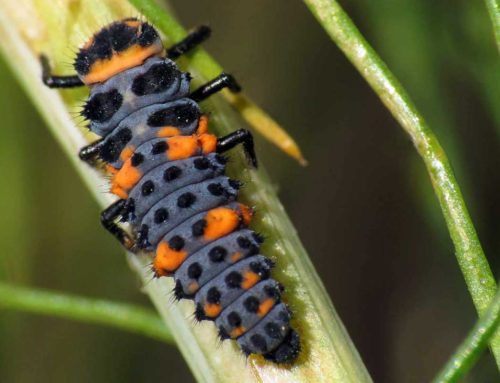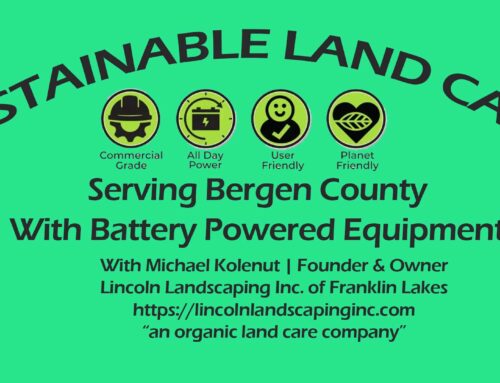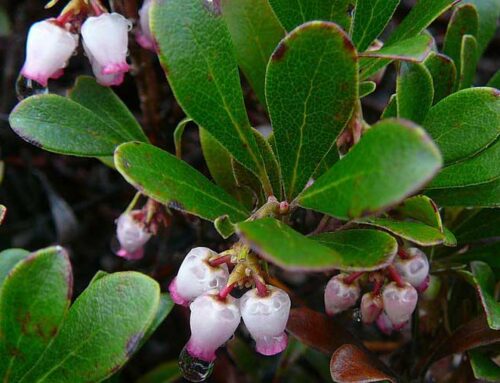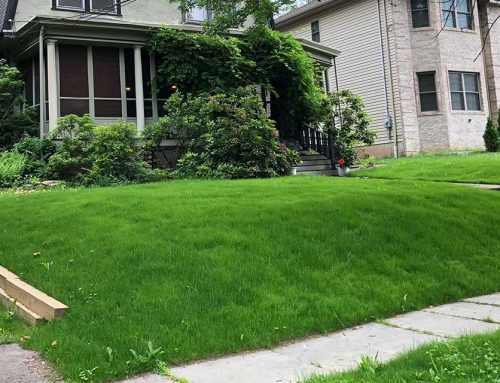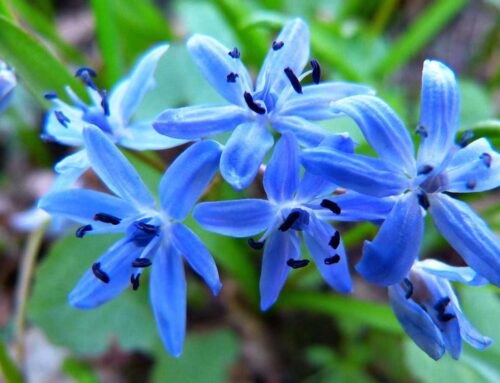Organic Land Care Concepts
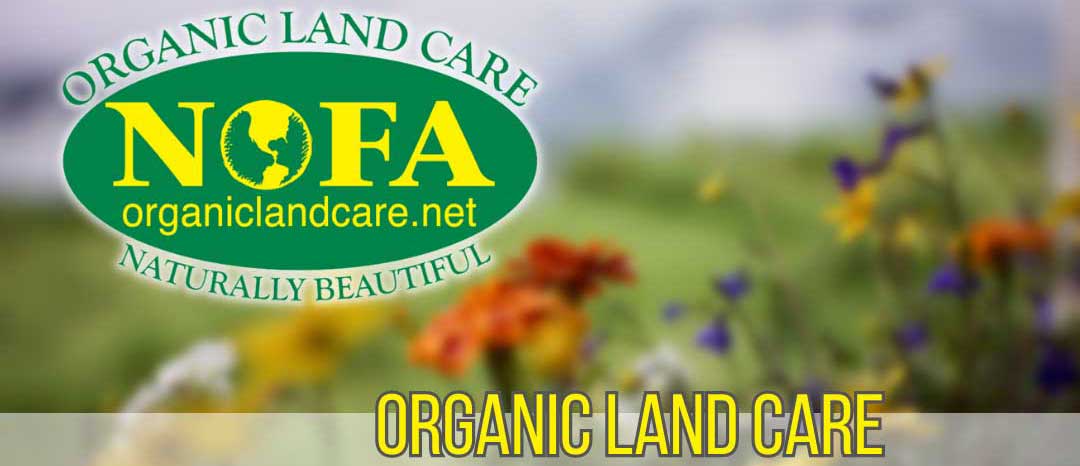
Lincoln Landscaping • An Accredited Land Care Professional
Lincoln Landscaping • An Accredited Land Care Professional
“What we now know and can show with multiple case studies, is that it is possible to manage a high-quality landscape without the use of pesticides or synthetic fertilizers. “
Sustainable Landscaping and Lawn Care
The question of what “organic” actually means can lead to a lot of confusion. Organic land care is not simply about the type of fertilizer or pesticide used on a home landscape. Organic Land Care is a holistic approach to landscaping that improves the natural resources of a site by fostering cycling of resources, promoting ecological balance, and conserving biodiversity; thereby restoring and enhancing biological cycles involving soil microorganisms, plants, and animals. It is based on minimal use of off-site inputs and on management practices that restore, maintain and enhance ecological harmony and beauty in urban and suburban landscapes and gardens. Organic, in particular, means landscaping with no synthetic pesticides of any kind (insecticides, herbicides, fungicides, etc.) and with no synthetic fertilizers or soil amendments.
Core Concepts
“Do no harm” by protecting the natural elements of a site.
A good example of this is the planting of only native plants within the landscaping and garden beds, an example of which can be found utilizing the link below. A list of native plants native to our climatic growing zone may also be found below. Doing so will attract beneficial insects and pollinators to your property thereby enhancing the eco-system as a whole without the use of pesticides and chemicals.
Treating the landscape as a whole living system.
All home landscapes are in fact mini ecosystems that support life and provide habitat and nourishment for bees, insects, birds, small mammals such as chipmunks and squirrels and more. Your plants also replenish the atmosphere’s oxygen, they sequester carbon and filter groundwater. All important and necessary aspects of sustainable landscaping. By increasing the biodiversity of your residential landscaping, you are playing a role in combating both climate change and species loss.
Treating the landscape as a whole living eco-system.
All home landscapes are in fact mini ecosystems that support life and provide habitat and nourishment for bees, insects, birds, small mammals such as chipmunks and squirrels and more. Your plants also replenish the atmosphere’s oxygen, they sequester carbon and filter groundwater. All important and necessary aspects of sustainable landscaping. By increasing the biodiversity of your residential landscaping, you are playing a role in combating both climate change and species loss.

Reducing energy, water, and material inputs
One such example of this is the use of rain barrels to collect nature’s rainfall. Environmentally, there are numerous benefits to using rain barrels. Essentially rainfall becomes “pennies from heaven“, collecting water for use in the garden beds thereby reducing your water bill. Water collected in a rain barrel would otherwise run or drain off the roof and become stormwater runoff, which is problematic. When excess water is directed into storm-drains the streams that they feed into are subjected to sudden surges of water, causing erosion and flooding.
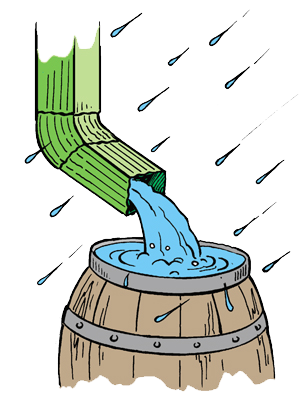
Promoting soil health which translates to healthy plants
Fertilizing with naturally-occurring materials to supply essential nutrients
Throughout the year we at Lincoln Landscaping promote and utilize compost and our own compost tea within our commercial projects, our playing fields and athletic fields, and within our residential properties with relation to both lawn and gardening and plant growth. We encourage and aid many a client in establishing a home compost pile and the maintenance and upkeep thereof.
Compost Tea, in simple terms, it is a concentrated liquid created by a process to increase the numbers of beneficial organisms as an organic approach to plant/soil care. Compost tea is an aerobic water solution that has extracted the microbe population from compost along with the nutrients. It is a well-balanced, organic supplement made by steeping aged compost in water.
Favor cultural practices over chemical applications for managing pests and diseases
Save your money and employ some beneficial insects into your garden beds you won’t have many problems and/or the need for chemicals and pesticides. They provide long-term control and will help tip the scales in your favor when insect pests arrive. In most cases, they’ll leave the good guys alone and will only go after the bad bugs. Conservation biological control (CBC) seeks to integrate beneficial insects back into ecological systems for natural pest control. This strategy is based upon ongoing research that now demonstrates a link between the conservation of natural habitat and reduced pest problems within the lawn and garden.
Natural enemies of insect pests, also known as biological control agents, include predators, parasitoids, and pathogens. At Lincoln Landscaping one of the practices that we strongly recommend is our “ninjas in the garden” project, an example of which shows the wonder and joy that our next generation can learn by practicing sustainable landscaping practices. In that video you will see lady bugs and praying mantis released into my garden. The adventure turned into a family celebration, as we watched them climb up each plant, looking for aphids, mites, caterpillars and such.
Encouraging Biodiversity
One of the best ways of doing so is (in the words of Crosby-Stills & Nash) to “teach your children“. Recently I came across this special CNN report: “The blossoming health and academic benefits of school gardens” wherein they detail some of the benefits of both a school garden and educating children about sustainable landscaping principles. At Lincoln Landscaping we promote and partner with schools and organizations to promote our tenets and principles within the youth of today and the gardeners of tomorrow.
By promoting these ideals within your children you will find that they soak up the information like a sponge and in doing so take ownership of their garden. They respect and care for it. All in all involving them leads to a delightful day in the garden and all will enjoy a wonderful experience learning about environmental stewardship.
Lincoln Landscaping Inc of Franklin Lakes
“creating eco-systems”
Lincoln Landscaping “The Natural Choice”
Mike Kolenut President & CEO
https://lincolnlandscapinginc.com
(201) 848-9699


